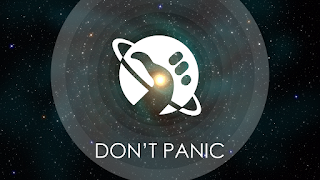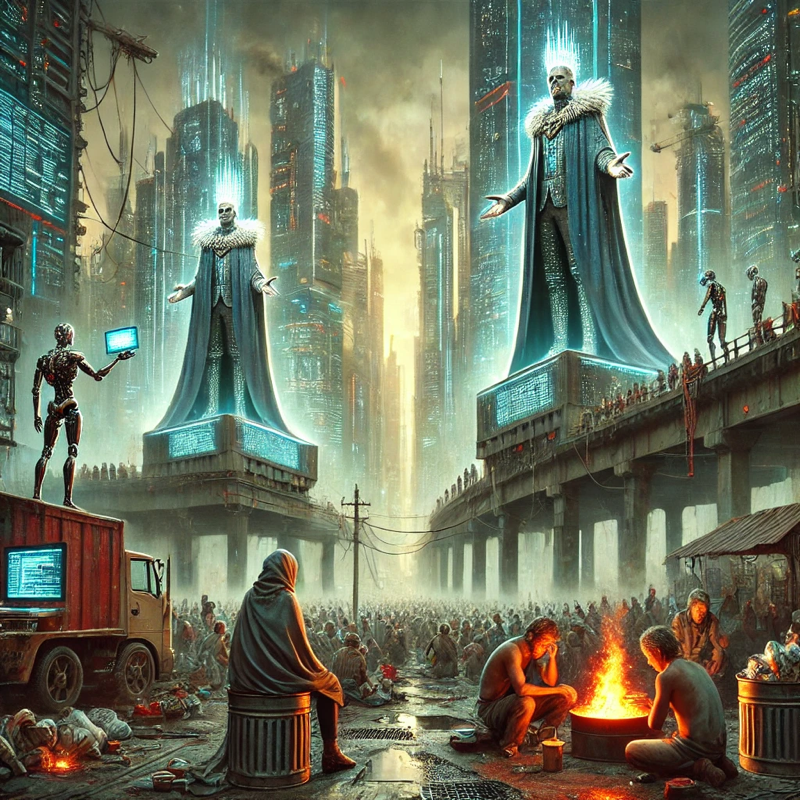Confronting the Small AI-Driven Dog That Threatens to Swallow the World
The other day I was laid up hacking and coughing in bed with a nasty bout of the summer flu. I wasn't in the mood to reflexively pick up my iPhone a thousand times a day as I normally do and read about yet another wave of moral and political outrages among the deluge of recent such news on social media. I think we can all agree, regardless of political persuasion, that neither Facebook nor Twitter are particularly conducive to tranquility or healing, save perhaps for funny cat videos.
So, completely bored and a bit groggy, I grabbed a random
book from my nightstand and re-read a short vignette from one of my favorite
novels, The Hitchiker’s Guide to the
Galaxy. I paraphrase here:
The leaders of two warlike species
were facing off across a negotiating table on the brink of intergalactic war,
when a wormhole suddenly opened up and an English phrase–which just happened to be a
highly insulting comment towards one’s mother in their language–was carried from
Earth through space and time to break the silence between them. Immediately,
the now infuriated leaders went to war, which raged for thousands of years before
they eventually identified the source of the insult and decided to unite
against their common enemy, Earth. Their warships then set off on a military
campaign to our distant planet, only to have their entire space armada swallowed whole upon arrival by a small dog due to a terrible miscalculation of scale.
During a split second of mental clarity that broke through my otherwise Nyquil induced haze, the passage struck me as particularly relevant to our currently fractious national discourse and the peril we could face if we descend into petty bickering and ignore the mega socio-economic paradigm shift–the small dog–that is looming before us.
Our current left vs. right, isolationalist vs. free-trade,
nationalist vs. globalist conflict, which is growing increasingly uncivil and all
consuming, now threatens to tear our nation, as well as other democratic
nations, apart. But if we closely analyze this tumultuous state of affairs and
the philosophical differences that underpin it, it is clear that what
we are really fighting are increasingly unproductive and irrelevant conflicts that are attempting to address imaginary problems such as loss of white privilege, unchecked immigration of murderers and rapists, or unfair trade deficits which are based on obsolete social,
political and economic paradigms and modalities. Any victories will be pyrric, regardless of political viewpoint, if the conflict distracts us from the larger coming paradigm shift that is both currently stirring current tensions but will
eventually, and not without considerably more turmoil, swallow us whole. I’m talking about the waiting maw of
AI and hyper-automation.
I know, I and others have talked ad nauseum about how automation
and AI will change the way we work (or not work) and disrupt our economic
system. But as a tech veteran who works in ground zero for this revolution, Mountain View, CA, in an industry at the center of AI development, cybersecurity, I have a unique perspective as perhaps the scout ship approaching the AI dog.
The AI/hyper-automation challenge facing us is far more vast that just weathering an
economic shift like the introduction of the lightbulb, car, or computer. It
even eclipses such convulsive historical shifts such as the decline into the
middle ages or the dawning of the renaissance and enlightenment thought.
Rather, it entails a fundamental meta shift in the deepest understanding of who we are as humans, and how
we organize our society, economy, political structure, and virtually every institution we have built.
Such meta shifts have only occurred twice in human history:
the shift from primitive hunter gathering societies to civilizations based on
agriculture and animal domestication, and the subsequent rise of industrial and
service oriented economies. Each of these shifts were at once gradual and immediate, depending on the phase of the shift, and changed every aspect of
society. A perhaps oversimplified chart is below:
Although the term cybernomics has been used in other contexts, I felt that
it describes the dawning age most appropriately. In subsequent blogs I
want to explore many of the practical implications of this cybernomic shift on
various aspects of American society, such as: can the education and socialization of children be dramatically improved and the family strengthened by the elimination of formal brick and mortar schools in favor of personal AI-driven teachers? Will we need to tax or enable fractional ownership of automated systems to compensate for the mass loss of jobs?
I will also explore the potential benefits of navigating this
shift successfully, as well as the pitfalls of failing to embrace it, since the
rest of the world naturally will. For instance, if we reverted to an mid-20th century version of industrialization as an alternative while the rest of the world didn't, how would we compete? Or alternately, could the owners of technology just wall themselves off in an Elysium type utopia while the other 99% dies off? No matter what path is taken, you can never put the AI dog back in his cage.
Much of the reactionary ideologies that have raised their
ugly heads globally such as neo-merchantilism, ethno-nationalism, xenophobia, isolationism,
and autocracy with tinges of divine right rule, are fighting a losing battle.
Demography, climate, and now technology are destiny. By resisting AI and automation we risk
being chewed up by the small dog while others who embrace it, such as the Chinese, successfully avoid its bite.


.png)


Comments
Post a Comment